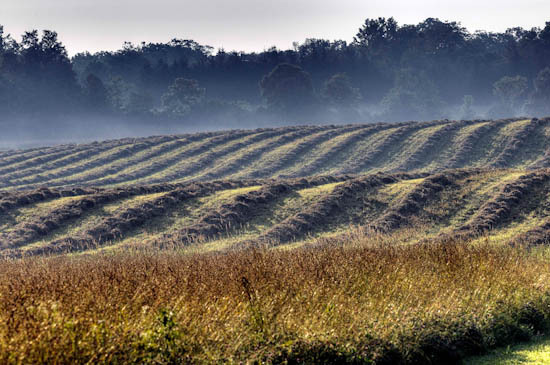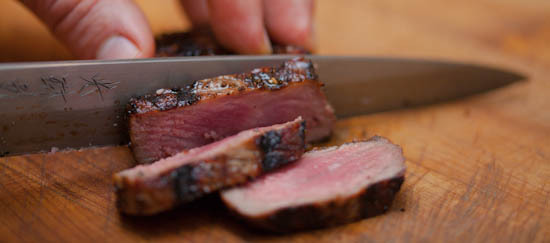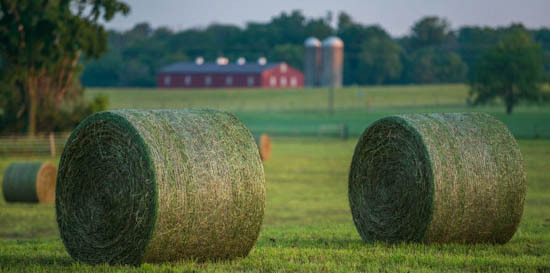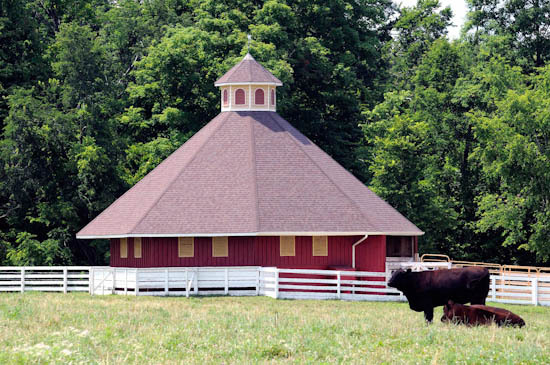Co-authored with Lee Glenn
A Hoosier farmer taking on the beef industry over the nutritional value of our beef supply! Beef high in anti-oxidants and omega fatty acids!* Education changing awareness of the nutrient density of beef -- all of this in a small town in the Midwest.
This is the combination this series is based on... those changing the quality of our food supply, producing nutrient dense foods and getting it to chefs who craft great meals.
Foodshed Exchange partner Mad Chef Jimmy Schmidt met Pete Eshelman at a Chefs Collaborative event on his farm, a venue to learn the nuances of properly cooking Wagyu beef. I had to talk to this man raising big beef in a little Indiana town. After a long flight and a drive through cornfield after cornfield, I found myself in classic Americana, old-world brick and stone, shutters on the windows... careful renovation bringing old buildings new life, with new purpose.
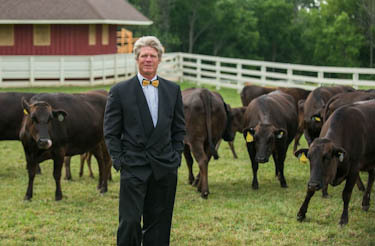 Pete Eshelman's history is based on hard work, leadership and perseverance. A former NY Yankee, mentored in business by owner George Steinbrenner, he built a successful insurance business representing athletes, teams and stadiums. Pete and wife Alice, located the business in rural Indiana for quality of life. Soon clients from around the world were coming for meetings.
Pete Eshelman's history is based on hard work, leadership and perseverance. A former NY Yankee, mentored in business by owner George Steinbrenner, he built a successful insurance business representing athletes, teams and stadiums. Pete and wife Alice, located the business in rural Indiana for quality of life. Soon clients from around the world were coming for meetings.
Early on, Pete recognized the value of gaining his client's trust through sharing a meal. "Insurance is all about trust. A meal around a dining room table establishes trust... it becomes more than just a transaction."
Meals started in the family dining room, but success brought the need for larger, more complete facilities. First came a private dining room in a renovated bank, then a private chef, then private use for other businesses. In 2000, Joseph Decuis Restaurant opened to the public and the restaurant took on a life of its own. Named after a New Orleans ancestor who started the family rule of eating together, it's strictly locavore, featuring the freshest available from the rich surrounding farmland.
"The path to perfect, everything from farm to fork, meant sourcing locally," Pete notes.
Around this time, Pete tried Wagyu beef and was captivated by its taste and texture. Wagyu, a Japanese breed, was little known in America so Pete traveled to Japan to learn the art of Wagyu husbandry from legendary Wagyu farmer Shogo Takeda.
"I realized that heartland palates are deadened due to the dominance of processed and fast food and thought it would be fun to teach people to enjoy better tasting, nutrient dense meals using my dining room, tying kitchen to farm and pioneering a new food attitude in Indiana... and the only way was to grow my own stock. Now, we are the only restaurant in America raising Wagyu on our own farm, using traditional Japanese practices."
This evening we're sitting in Joseph Decuis dining on the most succulent and flavorful beef I'd ever had. Over an appropriate wine pairing, Pete unravels the story of what we are eating:
•Superior genetics and correct diet have a direct relationship to improving Wagyu's health benefits*
•Wagyu can be high in antioxidants, unsaturated fatty acids and Omega 3*
•The marbling of Wagyu can produce a superior composition of fatty acids*
60 percent genetics, 40 percent best practices in husbandry, including a nutrient dense diet, translates into the most nutritious Wagyu. And taste... the marbling makes Wagyu.
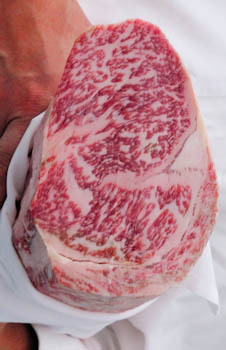 Historically, Wagyu were used as draft animals in Japan. The breed developed extensive intramuscular fat that melts quickly to supply energy to the muscles for extreme heavy work. Pure Wagyu has the highest percentage of unsaturated fats and essential fatty acids of all beef.* Genetically, there are only four of five Wagyu breeds in America. With not enough full bloods to meet demand, crossbreeding diversifies flavor, maintains nutrition and lowers cost.
Historically, Wagyu were used as draft animals in Japan. The breed developed extensive intramuscular fat that melts quickly to supply energy to the muscles for extreme heavy work. Pure Wagyu has the highest percentage of unsaturated fats and essential fatty acids of all beef.* Genetically, there are only four of five Wagyu breeds in America. With not enough full bloods to meet demand, crossbreeding diversifies flavor, maintains nutrition and lowers cost.
The Japanese believe in raising Wagyu in a tranquil, stress-free environment with natural feeds. Walking Pete's beautiful 400 acres, I could envy the 200 head sharing the picturesque fields. Two-hundred acres are rotationally seeded with nutrient dense grasses such as fescue, red clover, and alfalfa, grown through biodynamic farming practices. Next is the spacious finishing barn where a Japanese diet of soy meal, cracked corn and minerals reigns.
"They are not treated commercially in hot feedlots, crammed in minimal space, standing in manure and mud. You have to love the animals, checking on them 4-5 times a day. Time is your friend but they take twice as long to raise and are twice as costly to feed."
This is artisan beef making, Japanese perfected, Midwest adapted.
"Wagyu is like wine, it has its own history and how it's grown influences its flavor profiles. We should take as much interest in our beef as we do in our wine."
Pete believes connecting to our food sources is now in demand from a better-educated public and education is part of his mission. He recently acquired an 1884 farmstead across the street and is changing into a B&B with a teaching kitchen, a small animal birthing barn and a private dining room. In the works are 10 farm-to-fork courses over 2.5 days starting this summer.
The history of the breed, dispelling misconceptions and the tale of who hijacked four steers from Japan with a private jet, is the stuff of Wagyu legend. Pete's recently published book, America's Wagyu Trail, tells these tales and more.
Wagyu is making headway in the palettes of American diners. Down the street from our San Francisco home, a local steakhouse serves full blood and crossbred Wagyu. I left Indiana with enough Wagyu for my father's 80th birthday celebration, and the cacophony of "yummmmms!!!" at the table confirmed its scrumptiousness.
Because of Pete and other Wagyu farmers who are doing it right, great taste, healthy, and beef are finally speaking the same language.
*America's Wagyu Trail by J. Robert Britton & Steve Penhollow
Photography © Kyle Miron
